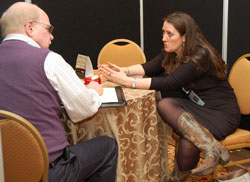 Contrary to popular belief, eating beef is not bad for the environment and Dr. Jude Capper with the Department of Animal Sciences at Washington State University has the research to prove it.
Contrary to popular belief, eating beef is not bad for the environment and Dr. Jude Capper with the Department of Animal Sciences at Washington State University has the research to prove it.
Jude talked about her findings to the media and during National Cattlemen’s Beef Association committee meetings at the recent Cattle Industry Convention in Nashville. “There’s a popular perception that the advances we’ve seen in productivity over the last 30-50 years have had a negative environmental impact,” she says. “But by improving productivity and everybody better understanding how to feed and raise cattle, we’ve actually cut the carbon footprint per pound of beef by 16% since 1977.”
Jude also busts the myth that grass fed beef is better for the environment. “On average, a grain fed system is going to be significantly more environmentally friendly than a grass fed system,” she says. The main reason is that grass fed animals are harvested at a lighter weight, but they take longer to get to that weight. “They take an average of 606 days to get from birth to harvest, versus about 420 or so in the corn-fed system,” Jude explains. “That means more total animal days (for grass fed), and that’s more feed, more land, more water, and more energy – and so therefore greater carbon footprint overall for the grass fed.”
Listen to my interview with Jude here: Jude Capper Interview
